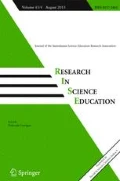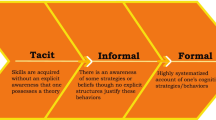Abstract
A series of studies were conducted to investigate students' metacognitive development in a second year chemical engineering course. The first of these was an exploratory study involving observation together with some limited interviewing. This was followed by a major study with two phases, the first of which involved a series of individual interviews with eleven students over the duration of the course, and the second of which involved a follow-up interview with each student two years later. In the first phase of the major study a theoretical framework characterising metacognitive development as a shift in approach to learning was utilised. The present paper draws on the findings of the second phase of the major study to both confirm the validity of this framework and also point to some of its shortcomings, specifically regarding the necessity of a certain emotional state in order for metacognitive development to take place, and the importance of the formation of a professional identity. It is suggested that metacognitive development needs to be characterised in broader terms than the usual cognitive focus in order to more fully account for students' experiences of learning.
Similar content being viewed by others
References
Baird, J. R. (1990). Metacognition, purposeful enquiry and conceptual change. In E. Hegarty-Hazel (Ed.), The student laboratory and the science curriculum (pp. 183–200). London: Routledge.
Baird, J. R., & Northfield, J. R. (1992). Learning from the PEEL experience. Melbourne, Australia: Monash University Printing Services.
Biggs, J. B., & Moore, P. J. (1993). The process of learning (3rd ed.). New York: Prentice Hall.
Case, J. M. (2000). Students' perceptions of context, approaches to learning and metacognitive development in a second year chemical engineering course. Unpublished PhD Thesis, Monash University, Melbourne, Australia.
Case, J. M., & Gunstone, R. F. (2002). Metacognitive development as a shift in approach to learning: An in-depth study. Studies in Higher Education, 27(4), 459–470.
Case, J. M., & Gunstone, R. F. (2003a). Approaches to learning in a second year chemical engineering course. International Journal of Science Education, 25(7), 801–819.
Case, J. M., & Gunstone, R. F. (2003b). Going deeper than deep and surface approaches: A study of students' perceptions of time. Teaching in Higher Education, 8(1), 55–69.
Case, J. M., Gunstone, R. F., & Lewis, A. E. (2001). Students' metacognitive development in an innovative second year chemical engineering course. Research in Science Education, 31(3), 331–355.
Case, J. M., & Jawitz, J. (2004). Using situated cognition theory in researching student experience of the workplace. Journal of Research in Science Teaching, 41(5), 415–431.
Case, J. M., & Marshall, D. (in press). Between deep and surface: Procedural approaches to learning in engineering contexts. Studies in Higher Education.
Entwistle, N. J. (1997). Reconstituting approaches to learning: A response to Webb. Higher Education, 33, 213–218.
Flavell, J. H. (1976). Metacognitive aspects of problem solving. In L. B. Resnick (Ed.), The nature of intelligence (pp. 231–235). Hillsdale, NJ: LawrenceErlbaum.
Linder, C., & Marshall, D. (1997). Introducing and evaluating metacognitive strategies in large-class introductory physics teaching. In C. Rust (Ed.), Improving student learning: Improving students as learners (pp. 411–422). Oxford, UK: Oxford Centre for Staff and Learning Development.
Marton, F., & Säljö, R. (1976). On qualitative differences in learning: I – outcome and process. British Journal of Educational Psychology, 46, 4–11.
Pintrich, P., & Groot, E. D. (1990). Motivational and self-regulated learning components of classroom academic performance. Journal of Educational Psychology, 82, 33–40.
Ramsden, P. (1988a). Context and strategy: Situational influences of learning. In R. R. Schmeck (Ed.), Learning strategies and learning styles (pp. 159–184). New York: Plenum Press.
Ramsden, P. (1988b). Studying learning: Improving teaching. In P. Ramsden (Ed.), Improving learning: New perspectives (pp. 13–31). London: Kogan Page.
Säljö, R. (1979). Learning in the learner's perspective. I. Some common-sense conceptions. Gothenburg, Sweden: Institute of Education, University of Göteborg.
White, R. T. (1998). Decisions and problems in research on metacognition. In K. G. Tobin (Ed.), International handbook of science education (pp. 1207–1213). Dordrecht, The Netherlands: Kluwer.
Author information
Authors and Affiliations
Corresponding author
Rights and permissions
About this article
Cite this article
Case, J., Gunstone, R. Metacognitive Development: A View beyond Cognition. Res Sci Educ 36, 51–67 (2006). https://doi.org/10.1007/s11165-004-3953-9
Issue Date:
DOI: https://doi.org/10.1007/s11165-004-3953-9




